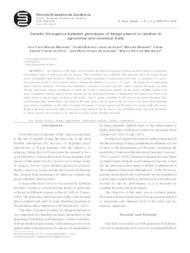Genetic divergence between genotypes of forage peanut in relation to agronomic and chemical traits.
Genetic divergence between genotypes of forage peanut in relation to agronomic and chemical traits.
Resumo: The objective of this study was to evaluate the genetic divergence of forage peanut in relation to agronomic and chemical traits in both rainy and dry seasons. This experiment was conducted with genotypes from the Forage Peanut Active Germoplasm Bank located in Embrapa Acre. Eighteen genotypes of forage peanut were used: 12 genotypes of A. pintoi, four genotypes of the A. repens species and two interspecific hybrids of A. pintoi × A. repens. The design was of randomized blocks with five replicates. All traits were submitted to analyses of variance and later, study of genetic divergence was done through multivariate analysis techniques, in which the Tocher's optimization method and the nearest neighbor method were used. Dissimilarity measure used in cluster analysis was the generalized distance of Mahalanobis. No pattern was found in the cluster based on species used, according to the results. There is genetic variability for all traits except neutral detergent fiber, acid detergent fiber, hemicellulose and lignin in the rainy season and for pests in the dry season. The traits which presented most relative contribution in the study of genetic divergence of forage peanut were flowering, dry matter yield and average height in the rainy season and crude protein and average height in the dry season. The established cluster may help the breeder to choose parents and crossings to be selected in forage peanut breeding programs.
Ano de publicação: 2012
Tipo de publicação: Artigo de periódico
Unidade: Embrapa Acre
Observações
1 - Por padrão são exibidas publicações dos últimos 20 anos. Para encontrar publicações mais antigas, configure o filtro ano de publicação, colocando o ano a partir do qual você deseja encontrar publicações. O filtro está na coluna da esquerda na busca acima.
2 - Para ler algumas publicações da Embrapa (apenas as que estão em formato ePub), é necessário ter, no celular ou computador, um desses softwares gratuitos. Sistemas Android: Google Play Livros; IOS: iBooks; Windows e Linux: software Calibre.
Acesse outras publicações
Acesse a Base de Dados da Pesquisa Agropecuária (BDPA) para consultar o acervo completo das bibliotecas da Embrapa.

